This report brings together current research – much of it unpublished – on the impact of HIV/AIDS on children in the South Asian region. It presents an overview of the findings of studies in Bangladesh, India, Nepal and Pakistan – with most of the research conducted in India.
Intended as a background and discussion document for the forthcoming meeting of the member states of the South Asian Association for Regional Cooperation to discuss strategies to respond to the needs and rights of children affected by HIV/AIDS, the report extracts key messages from the latest global literature on programming and policy related to children affected by HIV/AIDS. It provides basic statistics on the number of people living with HIV/AIDS and children affected by HIV/AIDS in the region. It also identifies the main issues regarding HIV/AIDS and children in the region: HIV diagnosis and treatment, stigma and discrimination, self exclusion, myths and misconceptions, and the social safety net - family care, institutional care and alternative care.
The report provides a number of conclusions and a series of recommendations for national action that touch on the need to focus on all affected children (not only orphans), to support and strengthen families, to provide psychosocial support, to overcome stigma, to protect children’s rights, to provide alternative care, and to build and strengthen partnerships and inter-sectoral coordination.
©UNICEF

